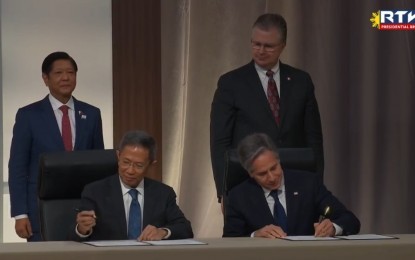National women’s alliance GABRIELA has voiced strong opposition to the recently enacted US-Philippines nuclear cooperation agreement, citing concerns over Philippine sovereignty and public safety.
“This nuclear deal is not about providing basic services to Filipinos. It’s about turning our country into a US military outpost and storage facility for their war machinery,” said Clarice Palce, secretary general of GABRIELA.
She accused President Ferdinand Marcos Jr. of compromising the country’s autonomy to further US military interests in the Asia-Pacific region.
In a press statement, the US Department of State said civil nuclear cooperation agreements, also known as 123 Agreements, provide a legal framework for exports of nuclear material, equipment, and components from the United States to another country.
It added that the agreement with the Philippines focuses on enhancing clean energy cooperation and strengthening long-term diplomatic and economic ties between the two nations.
Nuclear energy can help achieve these vital global climate change and energy security targets, and we look forward to exploring new avenues of cooperation with the Philippines in civil nuclear energy and other clean energy initiatives,” the statement read.
President Ferdinand R. Marcos Jr. recently expressed his administration’s commitment to integrating nuclear energy into the Philippines’ energy portfolio by 2032, leveraging a partnership with American providers.
The Marcos administration aims to boost the country’s renewable energy share to 35 percent by 2030 and 50 percent by 2040.
During the 16th US Embassy Media Seminar in Iloilo, US Ambassador to the Philippines MaryKay Carlson reaffirmed the United States’ dedication to assisting the Philippines in achieving its energy and climate objectives.
She highlighted the recent signing of the civil nuclear cooperation agreement as a prime example of this commitment.
“As an ally and partner, the US government is fully committed to supporting the Philippines in realizing this vision,” said Ambassador Carlson.
In a report by the Philippine News Agency, United States Embassy commercial counselor Paul Taylor said that around 40 companies are expected to participate in developing Philippine nuclear energy.
“Right now, we have 14 American companies that signed up for this industry-led civil nuclear industry working group. These 14 companies, we expect that to expand to as many as 40,” Taylor said.
He said the companies will provide technology, services, and know-how that the Philippines will need to accelerate the development of the industry.
Palce argued that the deal’s approach to privatization and public-private partnerships primarily serves foreign and corporate interests.
“They may try to conceal their true intentions by initially focusing on basic social services, but we know this will likely be implemented through privatization schemes or public-private partnerships that ultimately serve foreign and corporate interests, not the Filipino people,” she said.
Palce also raised alarms about the environmental and safety risks associated with nuclear facilities, particularly the disposal of nuclear waste and the strategic vulnerability it could introduce.
“The potential for the Philippines to become a target in case of regional conflicts involving the US places our nation and its people at grave risk,” she said.
Palce also warned against the potential consequences of increased foreign military presence and large-scale infrastructure projects in the country.









